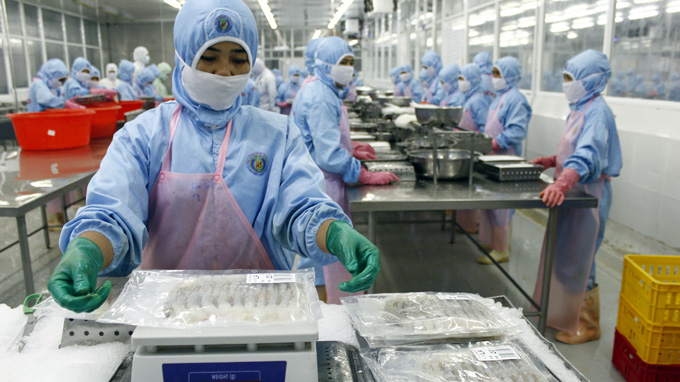Many local people and businesses are still unaware of the integration process Vietnam is taking part in, though they have lived within the ASEAN Economic Community (AEC) for many years, Pham Binh Minh, Deputy Prime Minister and Minister of Foreign Affairs, said at a conference held in Ho Chi Minh City on Friday last week.
>> An audio version of the story is available here
According to Deputy Prime Minister Minh, by the end of 2015, Vietnam must complete the last line of commitments, including political, security and defense, economic and social pledges, to building the AEC, Deputy PM Minh said at the conference on a number of problems Vietnam will face in international integration starting this year.
According to the Vietnamese diplomat, compared to other countries in the region, the proportion of Vietnamese people who understand the benefits brought through the AEC is very low, as about 60-70 percent of the respondents did not understand that EU-style community.
This is an alarming figure, he said at the conference.
Regarding competition within the AEC market, Vietnamese businesses are facing greater pressure from their competitors from other ASEAN economies, which are Indonesia, Malaysia, the Philippines, Singapore, Thailand, Brunei, Cambodia, Laos, and Myanmar.
Meanwhile, when exporting goods to the home countries of their ASEAN competitors, Vietnam’s firms faced many defensive lines.
As they do not have knowledge of the business regulations in these areas, they are confused by the process of expanding their market within ASEAN and find that they are unable to compete equally with their regional rivals, Foreign Minister Minh added.
In contrast, firms in other ASEAN countries, especially private enterprises, have already taken advantage of the AEC by increasing investment in expanding markets and boosting growth within the bloc.
"It seems that Vietnamese firms are trying to head to other markets rather than the 600-million-strong ASEAN market," Minh said.
As the AEC is forming, local firms with an edge in fields like shoes, textiles and agricultural products will have to compete with the same kinds of goods supplied by regional competitors, so they need to improve the quality and standards of their products, he added.
According to Minh, all the free trade agreements that Vietnam has negotiated have very high sets of standards for goods. So to avoid being left behind, local businesses need to have the initiative and actively seek directions when the market is open.
The government will also further efforts to boost institutional innovation, improve legal frameworks and policies, enhance economic competitiveness, create fair business environment equality, provide high-level human resources, and improve infrastructure to support business development, Minh said.
At another conference on the same matter held in Ho Chi Minh City early last week, many experts also said the difference in development between Vietnam and other countries in the ASEAN region is still considerable, and Vietnam has yet to jump into the top group.
Similar opinions were also ventured at a conference held in Hanoi last month.
Most local firms have little knowledge of how the AEC is going to affect their business, according to findings from surveys conducted by a renowned economics university and a business association.
“Sixty percent of the businesses surveyed have no idea what the AEC is,” Nguyen Hong Son, president of the National Economics University said at a conference in the capital city on January 22.
Having little knowledge of the EU-style AEC will prevent Vietnamese businesses from grabbing the opportunities the economic community will bring, Son said.
Vietnamese firms will thus fail to compete with other ASEAN rivals, he added.
“On a ten-point scale, I think the readiness for the AEC at the microcosmic level is only below five,” he said.
While the 60 percent figure is shocking enough, Le Vinh Son, chairman of the Hanoi Young Business Association, believes there are many more businesses which are heedless of the AEC.
Citing findings from the association’s own survey, Son said as many as 80 percent of the respondents, most of which are small- and medium-sized enterprises, are “indifferent and pay no attention to the AEC at all.”
Like us on Facebook or follow us on Twitter to get the latest news about Vietnam!




















































